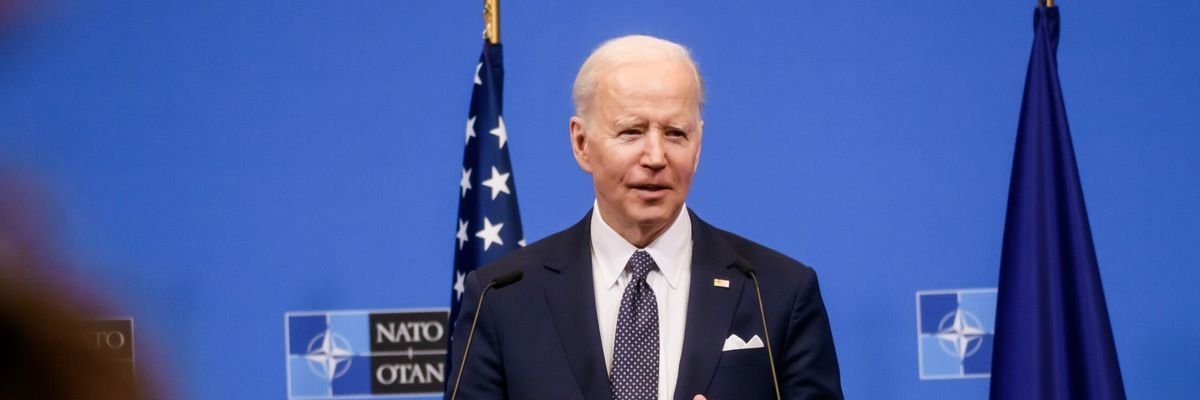With momentum building for Finland and Sweden to join NATO, don’t be surprised when calls for basing more U.S. military forces in Europe intensify leading up to NATO’s annual summit in June. Heeding such calls would be a grave and foolish error. Permanently installing new U.S. bases and troops in Europe would be militarily unnecessary, fiscally wasteful, and dangerously provocative amid sky-high tensions with nuclear-armed Russia.
You can understand why some in Europe are calling for a U.S. buildup following Vladimir Putin’s illegal invasion of Ukraine. Tiny Lithuania, Latvia, and Estonia are together about 1/100th the size of neighboring Russia. It’s no surprise that in March their presidents requested an increased U.S. and NATO presence in their countries and across Eastern Europe.
With the Biden administration sending thousands of troops to Europe, the chair of the Joint Chiefs of Staff General Mark A. Milley backed new U.S. bases, telling Congress, “I believe a lot of our allies…are very willing to establish permanent bases…. They will build them and pay for them.” Some in Congress soon jumped on the bandwagon to permanently station more U.S. troops on the continent.
While fears about Russia among some in Europe are understandable, U.S. leaders shouldn’t let these fears shape our strategy. I’m one of more than 30 military experts and organizations sending an open letter to the Biden administration and Congress this week opposing any new U.S. military bases in Europe and offering smarter ways to support Ukrainian, U.S., and European security.
As we emphasize, there’s no need for more U.S. bases or troops because there’s simply no threat requiring any additional military presence. Putin’s war has provided abundant evidence of the Russian military’s weakness. “Russia’s ground forces are in the process of demonstrating in Ukraine that they are incapable of posing any serious threat to NATO or Scandinavia,” Russia expert Anatol Lieven writes. If Ukraine’s military can hold off around 75 percent of Russia’s combat forces, NATO allies don’t need a larger U.S. military presence.
Too many bases
Far from needing more military infrastructure, there are already too many U.S. bases in Europe: nearly 300 sites, according to the Pentagon’s latest count and a comprehensive list I helped compile with Patterson Deppen and Leah Bolger. There are 123 sites in Germany, 49 in Italy, 22 in Great Britain, and 14 in Turkey, among others. In Eastern Europe, there are now six bases in Romania, four in both Poland and Hungary, two in Slovakia, and one each in Estonia, Georgia, and Latvia. Worldwide the U.S. military has around 750 military bases in foreign countries. For perspective, Russia has a few dozen at most. China has eight (plus those in Tibet).
NATO allies also have hundreds of their own bases and around 2 million troops and other personnel that are more than capable to defend Europe from any hypothetical but incredibly unlikely Russian attack. U.S., British, and French nuclear weapons and NATO’s Article 5, which requires members to defend any member that’s attacked, are more than adequate to prevent any thought of a Russian invasion of NATO. Putin may have been foolish enough to try to conquer Ukraine; it’s hard to imagine he would be so foolish as to contemplate a suicidal invasion of NATO. Deploying new U.S. bases and troops to Europe is simply unnecessary.
A European buildup would also distract the U.S. military from defending the United States and waste billions of dollars better spent on crumbling infrastructure and other urgent needs at home. U.S. taxpayers already spend far too much maintaining bases and what are now around 100,000 troops in Europe: around $30 billion this year, which is about one-third larger than the Department of Agriculture’s budget and three times the Environmental Protection Agency’s.
Some will argue that if allies are willing to pay for new bases, what’s the harm? The fact is that even if allies build the bases, U.S. taxpayers will spend considerably more to maintain larger numbers of U.S. forces in Europe due to transportation costs, increased salaries, and other expenses. U.S. bases in Japan, for example, are still more expensive than comparable installations in the United States even when the Japanese government spends more on U.S. bases than any host nation. Costs at bases overseas also tend to escalate over time, helping to bloat the vastly bloated Pentagon budget.
Expanding our military presence in Europe would be dangerous because it would escalate military tensions with Russia further and make it more difficult to find a negotiated end to the Ukraine war. Putin recently said he has “no problems” with Finland and Sweden joining NATO but cautioned pointedly, “the expansion of military infrastructure on this territory will undoubtedly cause us to respond.” Creating new U.S. bases in Eastern Europe, closer and closer to Russia’s borders, as part of NATO’s expansion following the fall of the Soviet Union was an unforced error that should not be repeated.
Consider how U.S. leaders and the public would respond if Russia were to build bases in Cuba, Venezuela, and Central America or if Russia discussed plans for a military alliance with Mexico involving possible Russian bases near the U.S. southern border. The thought experiment isn’t necessary: the creation of a single Soviet missile base in Cuba in 1962 yielded the Cuban Missile Crisis and brought the world to the brink of nuclear war. Building new U.S. bases anywhere in Eastern Europe would provoke Russia unnecessarily, increasing the risk of a direct military clash and the all-too-real possibility of nuclear Armageddon.
A better approach
When asked how we will reassure our NATO allies if we don’t respond to requests for more bases and troops, some will say, “We’ve got your back.”
But U.S. officials can reassure allies with their words and a clear portrayal of NATO’s overwhelming military strength compared to Russia’s. U.S. leaders should say, “We’ve got the world’s most powerful military. You’re part of NATO. We’ve assessed Russian military power. We and our NATO allies have plenty of capacity to defend Europe.” (Don’t forget that some NATO allies asking for a U.S. buildup are responding to domestic political pressure to “do something” given local fears about Russia.)
Rather than an unnecessary military buildup, the United States and NATO can build a new European security architecture as part of efforts to negotiate an end to the war in Ukraine. The Biden administration should start by promising not to build new bases in Eastern Europe, Finland, or Sweden. The U.S. and NATO next can urge Russia to return to treaties, such as the Conventional Armed Forces in Europe Treaty, monitoring the deployment of conventional and nuclear forces at European bases.
Administration officials also can promise — publicly or privately — to reduce U.S. and NATO forces, withdraw offensive weapons systems, and close bases in Europe. This wouldn’t be a gift to Putin, as some might suggest. The U.S. can and should close bases and withdraw forces as a sign of strength and confidence in the power of the U.S. military and NATO and as a reflection of the actual Russian threat. The John F. Kennedy administration made similar moves to end the Cuban Missile Crisis by secretly promising the Soviet Union it would remove nuclear-armed missiles from U.S. bases in Turkey.
Military and civilian leaders also need to come clean and admit that the vast majority of bases and troops in Europe aren’t there to defend the continent. There are some 300 installations in countries including Germany, Italy, and Britain three decades after the Cold War’s end primarily because they’ve made it easier for U.S. officials to launch and wage catastrophic wars in the Middle East, Africa, and beyond. Most should have closed decades ago.
The deployment of thousands of troops from the United States to Europe has shown that rapid response forces can be based in the 50 states, rather than overseas, thanks to fast air and sealift capabilities. Instead of maintaining expensive permanent bases, the U.S. military can rely primarily or perhaps exclusively on better, more cost effective ways to support European security such as access agreements at NATO allies’ bases, the maintenance of weapons shipment and broader logistics systems, joint training arrangements, and prepositioning.The best of all ways for the United States to be a friend and ally in Europe is to dedicate itself to supporting negotiations to end the war in Ukraine as quickly as possible and to building a lasting security infrastructure based on treaties, demilitarization, and conflict resolution. Building up a Cold War-style U.S. military presence in Eastern Europe is a recipe for wasting billions of dollars, deepening the risk of a direct, possibly nuclear war with Russia, and extending the fighting and suffering in Ukraine for years to come.
















